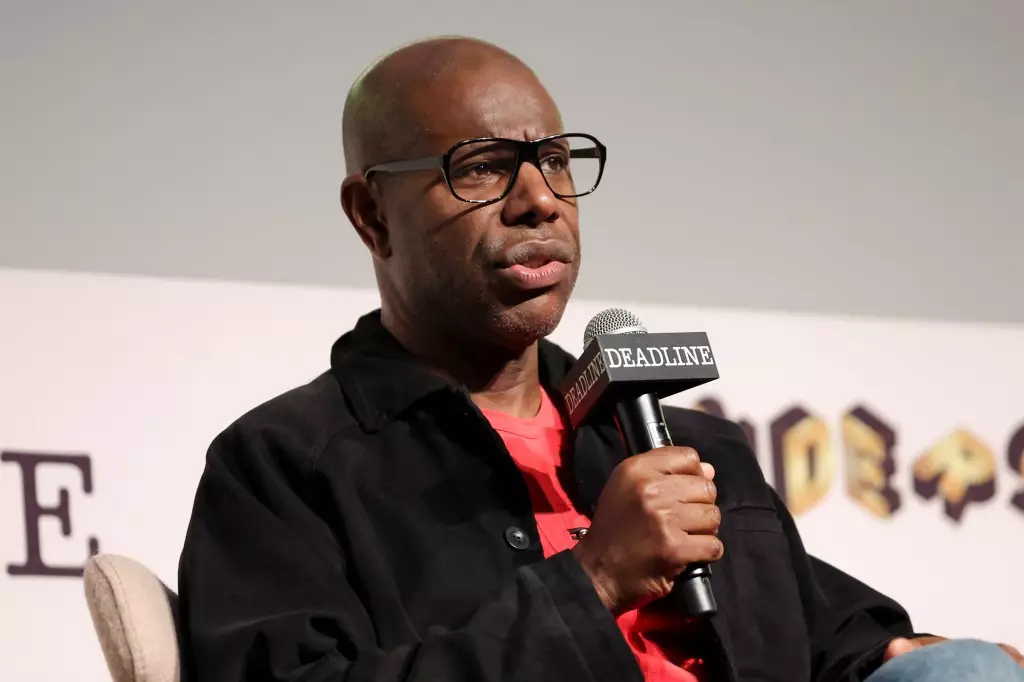Decades after the end of World War II, the conflict continues to inspire filmmakers, writers, and historians to explore its impact from varying angles. A fresh perspective can make familiar stories feel vibrant and poignant, as evidenced by the latest offering from acclaimed director Steve McQueen. In his film “Blitz,” McQueen opts to narrate a poignant tale through the experiences of a young child, reframing our understanding of war and its consequences. By exploring this harrowing period through the innocence of childhood, McQueen challenges audiences to regain a sense of childlike wonder and curiosity that often diminishes with adulthood.
McQueen’s aim is clear: to refresh our perspective on the past by returning to the emotional core that often gets overshadowed by historical fact and societal skepticism. During a recent discussion at Deadline’s Contenders Film event in Los Angeles, McQueen asserted that the innocence exemplified by children requires adults to “refocus our gaze.” He recounts a personal story about his own daughter to illustrate how children’s observations can remind us of fundamental truths about life that we sometimes overlook. This intentional exploration of innocence against the backdrop of war serves as a call to action for viewers to reconsider what has been normalized in our collective consciousness regarding conflict and loss.
In “Blitz,” we follow the young protagonist George, played by Elliot Hefferman, whose journey begins with his mother, Rita (portrayed by Saoirse Ronan), sending him away from the air raids of London to seek safety in the countryside. This act of separation sets off a series of trials as George, determined to reunite with his family, encounters dangerous situations. His perspective as a child not only emphasizes the personal stakes of war but also highlights the resilient spirit of youth amidst chaos.
McQueen’s decision to highlight George’s innocence is noteworthy, as it contrasts starkly with the harsh realities of war. The film’s narrative forces audiences to view the tumultuous events of the Second World War through George’s eyes, evoking an emotional response that fosters a deeper understanding of the fear, confusion, and tenacity that characterized that era. McQueen’s inspiration for the film stemmed from a photograph of a child awaiting evacuation, a powerful image that illustrates how children are often caught in the crossfire of adult conflicts. By capitalizing on this angle, the film not only reinvigorates a well-trodden historical narrative but also elevates it into a deeply personal tale of a boy longing for home.
To authentically depict the era and the emotional weight of her character, Ronan undertook extensive preparation, collaborating with a dialect coach to capture the nuances of the Cockney accent, that vibrant dialect synonymous with London’s working class during the war. In her portrayal, Ronan expresses the complexities of a mother desperate for her son while also embodying the strength and dignity of women in that turbulent time. Her attention to dialect not only serves as a bridge to the past but also gives depth to Rita’s character, allowing audiences to grasp the societal norms and values of the period.
Ronan’s reflections on the vintage sound of the Cockney accent emphasize the importance of authenticity in storytelling. This attention to detail immerses viewers further into the film’s setting, reminding us that the people who lived through those times were multifaceted individuals striving for a semblance of normalcy amid unimaginable turmoil. The manner in which working-class women carried themselves, regardless of their struggles, serves as a testament to their resilience and tenacity.
Ultimately, “Blitz” seeks to bridge the gap between history and modernity by drawing attention to themes of innocence, resilience, and the cyclical nature of conflict. By employing a child’s perspective, McQueen compels viewers to confront their own perceptions of historical narratives, urging them to rediscover the emotional gravitas beneath the surface of recorded history. As audiences immerse themselves in George’s journey, they are invited to reflect on the enduring implications of war and its impact on future generations.
In a world where narratives can often become staid and repetitive, McQueen’s commitment to delivering a fresh, emotionally resonant story through the lens of a child serves as both a poignant reminder and a call to action. It encourages us to listen, see, and remember—never allowing the innocence of youth to fade in the shadows of adult cynicism. With “Blitz,” the message is clear: it is only through these renewed perspectives that we can confront the realities of our past and ponder the implications for our future.
